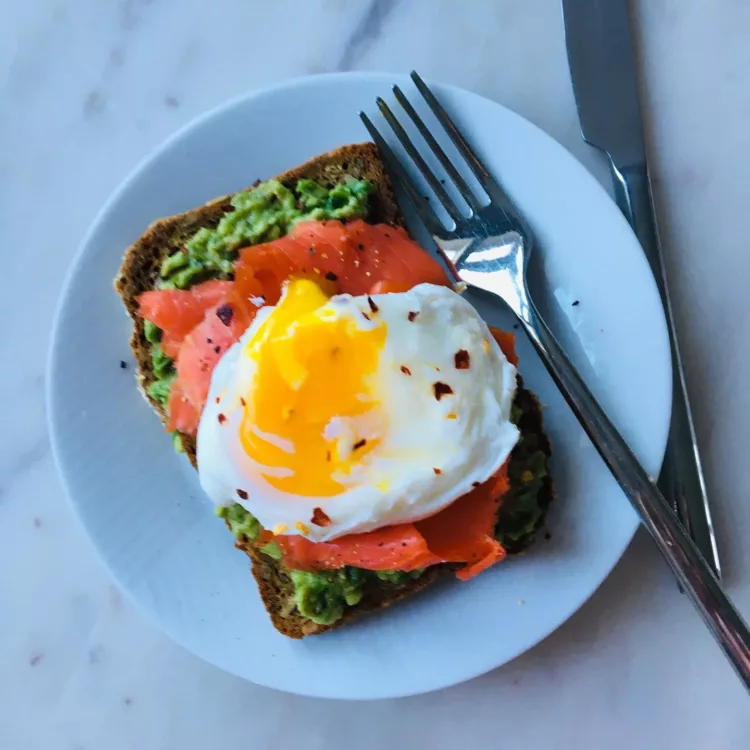One of the symptoms of peri-menopause you may not be aware of is how your fluctuating levels of hormones could also affect your ability to control your blood sugar balance as effectively.
And as a result, you could experience an increase in symptoms such as hot flushes, night sweats, increased anxiety, food cravings, night waking, fatigue, poor concentration, and weight gain.
One of the ways that you can address this is by ensuring you have enough protein, healthy fats and fibre at each meal, especially for your first meal of the day.
The first meal of the day is arguably the most important one, as it could affect your blood sugar control for the rest of the day.
Meals containing a balance of proteins, fats, and fibre can also keep you feeling fuller for longer supporting energy levels, mental clarity, and mood throughout the day and helping to prevent food cravings.
Additionally, protein helps to build (and maintain) muscle mass. We lose lean muscle mass as we age and this is accelerated during peri-menopause. This is one of the reasons regular exercise is so important in midlife.
Healthy fats are essential to make hormones. A low-fat diet is definitely not one to follow in peri-menopause!
And fibre helps to maintain a healthy balance of beneficial bacteria in your gut as well as maintain healthy bowel movements.
How much protein do you need?
An easy way to calculate how much protein to include in your diet per day is to allow 1g of protein per kg of your body weight. You may need more if you are very active.
Some foods may also affect your blood sugar more than others, and dairy is one of those food groups for me. One of the best ways to find out what foods affect you is by monitoring your blood sugar levels after eating.
Many women do not include enough protein in their meals, particularly at breakfast.
Eating enough protein and healthy fats for breakfast is one of the best ways that I know of managing hot flushes, night sweats, food cravings, night waking, fatigue, and concentration levels. It may not solve the problem completely, but in my experience, it has definitely helped me.
Not sure what foods contain protein and fats? Here is a list of a few
Protein Foods Healthy Fat Foods
Chicken and Turkey – 85g = 20g protein Extra virgin olive oil
1 Egg = approx 6g of protein Avocado/avocado oil
Meats = 85g = 20g protein Coconut oil
Fish = 85g = 20g protein Nuts/seeds & nut/seed butters
Tofu and tempeh = 170g = 18g protein Oily fish
Lentils = 1 cup = 18g protein Olives
Nuts and seeds = 85g = 15g protein Ghee
Protein powders = vary, check packaging Grassfed butter
All weights and protein content are approximate.
Eggs, nuts and seeds and oily fish have both proteins and fats
To get you started here are 7 Protein and Healthy Fat Meals to Start Your Day
Here are 7 meal examples of combining protein and healthy fats which you may like to try to see if they make a difference to your symptoms and your overall health.
-
2-3 eggs (any way you like) with avocado and some green leafy vegetables
-
Smoked salmon or sardines https://www.pinterest.co.uk/pin/787004103632715071/ with freshly squeezed lemon and sauerkraut on seed crackers https://wp.me/paQJYE-q3
-
100g roast chicken or turkey breast with olives, salad or veggies
-
Chia seed breakfast pudding with tahini and pumpkin seeds https://wp.me/paQJYE-hE
-
170g tofu or tempeh seasoned & scrambled with green leafy veggies https://www.pinterest.co.uk/pin/787004103632714895/
-
Nut and seed granola https://wp.me/paQJYE-iG with Greek yoghurt and fresh berries
-
A smoothie with a portion of whey or pea protein powder https://wp.me/paQJYE-n
For more tips and advice on perimenopause and menopause join a growing group of like-minded women here
To receive your FREE checklist of the Top 10 Foods to Include in Your Diet During Menopause click here
